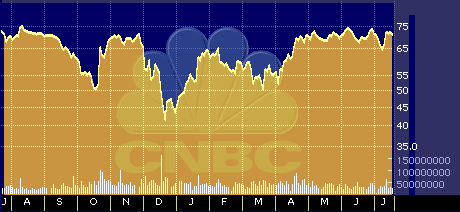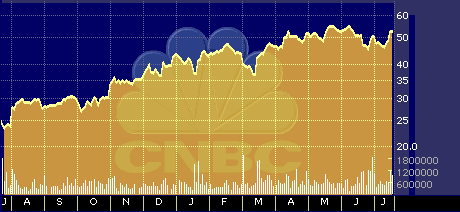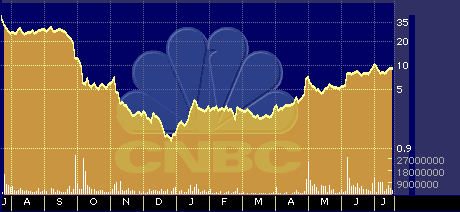
Expedia IPO Takes Off Strongly
Expedia IPO Takes Off Strongly
by Hal Plotkin
Silicon Valley Correspondent
Despite Microsoft Corp.’s {MSFT} woes, analysts expected the company’s online travel agency, Expedia Inc., to enjoy a successful initial debut today. Expedia hit the market at $39 a share, up 179 percent from last night’s pre-trading price of $14 a share.
The 5.2 million share offering led by Goldman Sachs will raise at least $72 million for Expedia {EXPE}, in which Microsoft holds an 86 percent share.
“I think [Expedia’s IPO] is going to do really well,” says Barry Parr, director of consumer e-commerce research at International Data Corp., based in San Jose, Calif. “Expedia has a terrific product, it was early in the marketplace, it’s a great brand, and the company has a very good partner in Microsoft.”

MSFT 52-week chart
Expedia was created by Microsoft in October 1996. The company’s upcoming IPO illustrates what could happen should the federal government eventually force Microsoft to split into two or more companies: successful stock offerings by firms incubated with the help of Microsoft’s extensive technical and marketing apparatus.
Expedia, based in Redmond, Wash., offers a full range of online travel services, including airline tickets, cruise packages, car rentals, and hotel reservations. The company posted a loss of $19.6 million on revenue of $38.7 million for the fiscal year ended June 30, as compared with a loss of $29.5 million on revenue of $13.8 million in fiscal 1998.
Expedia has a joint-marketing arrangement with Microsoft’s MSN.com, one of the leading online portals, as well as with Microsoft’s 30-million user Hotmail free e-mail service, and with Microsoft’s still-fledgling WebTV operation.
Expedia is either the first or second most-popular online travel firm, depending on which researchers do the measuring and which time period is considered. Expedia’s S-1, the company’s official pre-IPO document filed with the SEC, claims its site was the single most-visited travel site on the Web for each of the six months ended Sept. 30, based on figures supplied by Media Metrix, based in New York.
More-recent figures compiled by PC Data Online, based in Reston, Va., however, put Expedia in second place among online travel firms, behind rival Travelocity, which is owned by Fort Worth, Texas-based Sabre Inc. {TSG}.

TSG 52-week chart
Last month, Sabre’s Travelocity announced plans to merge with the third-ranked player, Preview Travel Inc. {PTVL}, which is based in San Francisco. American Airlines parent corporation, AMR Corp. {AMR}, owns 83 percent of Sabre. The soon-to-be-combined firm has marketing arrangements with a number of leading Internet portals, including AOL.com, Excite, Lycos, and Snap!
Mark Rowan, senior analyst at Prudential Securities Inc., based in New York, says the merger of Travelocity and Preview Travel makes Travelocity the No. 1 player and Expedia No. 2.
“Clearly, the leader will get more of the economic advantages over the second-tier company,” Rowan says. “But the market is big enough for two winners.”
Rowan rates Preview Travel a “strong buy” and has a 12-month price target of $40 for the stock.
Robert Martin, an Internet analyst at Washington investment bank Friedman Billings Ramsey & Co., says there’s little doubt the Travelocity-Preview Travel merger will have a sizable impact.
“Now, you have a clearly-defined leader,” Martin says. “The combination between the two companies positions them as a powerhouse in the industry.”
Martin says Expedia’s IPO reflects Microsoft’s “desire to accelerate [Expedia’s] business plan.”
Analysts say Expedia is likely to do well for many of the same reasons that contributed to post-IPO gains at other online travel providers, such as Preview Travel and priceline.com Inc. {PCLN}.

PCLN 8-month chart
One reason for the optimism: Travel has already become the largest online-retail category, with estimated online transactions of $7.8 billion in 1999, growing to $32 billion by 2004, according to Forrester Research.
Phil Daniels, an analyst at PC Data Online, warns, however, that enthusiasm for the upcoming Expedia IPO could be tempered by the recent findings of fact in the Microsoft antitrust case. In addition, he says expectations for online travel services were at a fever pitch back when rivals Preview Travel and priceline.com launched their IPOs.
“I don’t sense the same fervor right now,” Daniels says. “I think it will be successful. But I don’t think it’s going to be a big blockbuster.”
On the other hand, analysts also say changes in the structure of the travel industry are sure to drive increasing numbers of customers to online-ticketing services such as Expedia, particularly now that airlines are reducing commissions paid to traditional travel agencies.
“As the brick-and-mortar travel agencies charge fees and surcharges to make up for lost revenue, that will accelerate the process of moving customers online,” Rowan says.
Rowan says he’s optimistic about the prospects for both Expedia and it’s newly merging rival, the combination of Preview Travel and Travelocity.
“They are both in a terrific space, both have good technology, and are generating good customer experiences,” Rowan says.
Rowan’s review is mirrored by the most-recent comparative quality rankings of online travel agencies assembled by Lincoln, Mass.-based Gomez Advisors Inc.
Preview Travel won Gomez Advisors’ top overall ranking, with Travelocity coming in third, and Expedia seventh, out of 20 firms included in the survey. Expedia however, won the coveted No. 1 position in Gomez’s critical “ease-of-use” category.
“Microsoft’s Expedia continues to experiment with new technologies, keeping the competition on their toes,” according to the most-recent Gomez Advisors ranking report.
Rowan says he’s encouraged by recent statistics that show more online browsers becoming online buyers.
“People are becoming more accustomed to buying large-ticket items online, including airline tickets,” Rowan says. “Over time, that means online travel agents will gain a significant share of the market.”
Expedia is mired in litigation with priceline.com, which claims exclusive rights to the “name your own price” system of selling travel services. Most analysts, however, say they don’t think the outcome of the case, win or lose, will have much of an affect on Expedia because of the more-limited appeal of services that don’t allow customers to decide exactly when, or on which airline, they’ll travel.
Expedia is expected to offer 5.2 million shares, priced somewhere between $10 and $12 each, later this week. Microsoft will own 86.4 percent of the company once the offering is complete.


